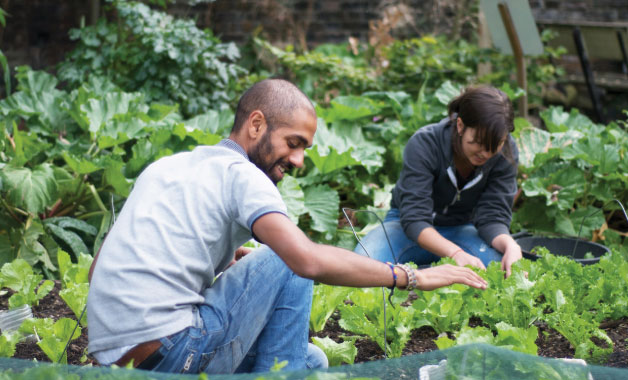Make your voice heard: the Mayor of London’s Environment Strategy
The Mayor is inviting feedback on his draft London Environment Strategy by midnight Friday 17th November. This is your chance to ensure good food is on London's policy agenda.

The strategy has set out the Mayor’s priorities covering air quality, threatened greenspaces, declining wildlife and flood risk, to growing energy demands and water scarcity. These are are all clearly pressing issues but as we know food not only contributes to environmental issues such as climate change, but also provides many solutions, such as the contribution Capital Growth food growing spaces have made to biodiversity in the capital.
While we welcome many of the objectives set out by the Mayor, London Food Link believes that the link between food and environment has not been made clear and there is more opportunity within this statutory strategy to incorporate food policy and initiatives that can have a positive outcome on London’s environment.
Have your say
Whether you're responding as an individual or organisation, we would love you to echo our main suggestions below about what's missing. Deadline Friday 17 November.
Individuals - respond to the strategy here
Organisations - respond to the strategy here
They are encouraging people to answer specific questions but there is also an option to upload an additional document. If you want to go into more detail please feel free to reinforce any elements that you agree with from the detailed response wehave drafted.
Proposals
The strategy - which can be read here - covers a variety of proposals. In particular, it:
- sets out new approaches including a healthy streets indicator, although this does not reference food
- recognises the importance of food waste with targets for reduction of food waste (by 20% per person by 2025) and commits to tackle single use packaging
- sets out proposals to benefit biodiversity and the city's natural heritage with a focus on protection of various wildlife sites and habitats as well as the Green Belt
- aims to increase cover of green space, enhance access to green space and to increase the amount of greenery on our buildings and along our streets (for example with living roofs, street trees and rain gardens)
- references the creation of a National Park City and Parks Commission
- talks about a new urban Green Factor that ‘might’ lead to more food growing spaces
- references the achievements of Capital Growth
What's missing?
Overall we think that the Mayor could deliver stronger leadership and be more ambitious. We also feel that the link between health and environment is not made strongly and that there could be more integration or reference to other strategies, particularly how this statutory strategy could support some of the other non-statutory strategies such as the food strategy. Beyond this, the main points we want to make are:
- Reduce food waste: We applaud the commitment to reduce food waste, and within this, to commit to tackling plastic bottle waste, which we believe should be tied to hugely increasing access to tap water, thus making the link with the Health Inequalities strategy. We believe this could be achieved through a new generation of water fountains and water refill points in public spaces e.g. tube stations, parks, sports facilities, schools, should be prioritised, funded by private/community partnerships or through a levy on plastic bottles, and with the cooperation of Thames Water, Transport for London, parks departments, community groups and others.
- Food Growing: We think that London’s community food gardens, allotments and farms are noticeable by their absence from this strategy. There should be explicit commitment to value these spaces and increase their coverage due to their role in engaging people in the management of green spaces and their role as wildlife habitats, as well as a commitment to protecting the greenbelt and peri-urban fringe by creating innovative urban farms.
- Green Enterprise: Under the sections on Green Infrastructure and Circular Economy we applaud the attention to supporting enterprises but want the strategy to explicitly commit to support the food sector whether through recycling food that would otherwise go to waste and the opportunities within the food growing economy to contribute to low carbon and circular economy initiatives, such as creating new food products, growing more local food and composting.
- Climate Change: Shockingly there is no recognition in the strategy of the huge contribution of food and farming towards greenhouse gas emissions. The strategy needs to include plans on how the Mayor will curb emissions linked to food and farming, as well as prepare contingency plans for adaptation to food supplies due to climate change.
- GLA leadership: Under the section on GLA group operations we are pleased that there is recognition of the role that caterers can play in providing tap water to reduce plastic bottle waste, but this needs to go further in advocating for sustainable food and drink across all GLA and TfL properties and catering provided. We believe that TfL advertising policies should reflect the Mayor’s strategies (particularly Environment, Health Inequalities and Food), and consider implementing a levy on adverts for products and services that contradict these Strategies' aims.
This response has been drafted by the London Food Link team at Sustain. To support our work as the voice for good food in London, please join us.
10/11/2017
Support our work
Your donation will help communities grow more food in gardens across London.
Capital Growth is a project of Sustain: the alliance for better food and farming.
Expert food growers wanted for Capital Growth’s 2025 training program
Celebrate the abundance in London this September with Urban Harvest
Behind the garden gate: how London’s food gardens are producing much more than just food




